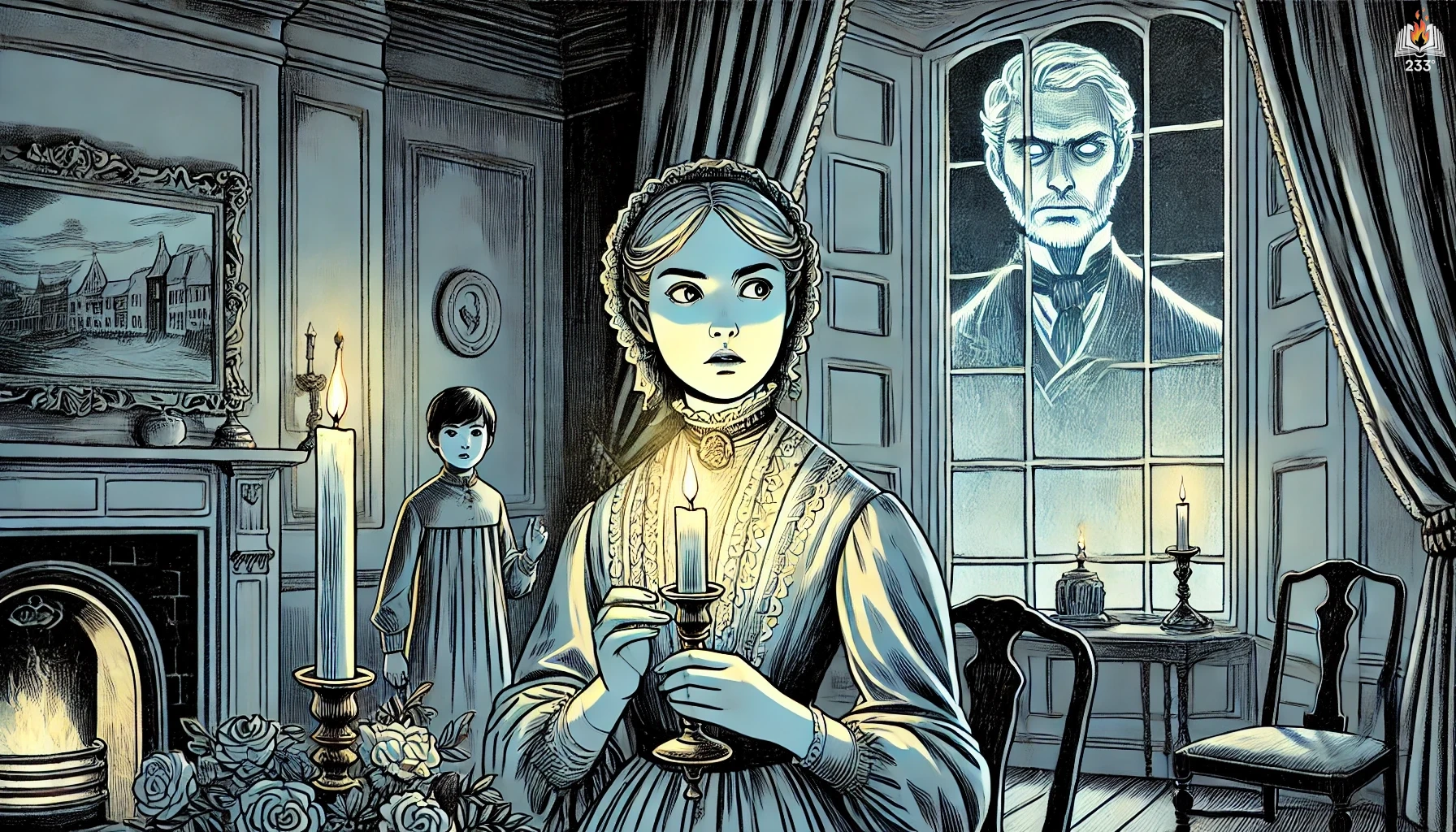The Bostonians is a novel written by Henry James, first published in 1886. Set in post-Civil War America, the novel explores the social, political, and gender dynamics of the period, focusing on the burgeoning feminist movement and contrasting traditional values with progressive ideals. The story is framed around a love triangle between a conservative Southern lawyer, Basil Ransom, a fervent Boston feminist, Olive Chancellor, and Verena Tarrant, a captivating young woman who becomes the object of both their affections. James masterfully delves into the personal, ideological, and emotional conflicts at play, offering a critical yet nuanced view of the times.
Plot Summary
Basil Ransom, a conservative lawyer from Mississippi, arrives in Boston in the wake of the Civil War, hoping to restart his life in the North. He visits his cousin, Olive Chancellor, a fervent advocate for women’s rights and social reform. Olive, a solemn and intense woman, is deeply devoted to the feminist cause, believing it to be her life’s mission to liberate women from societal restraints. When Basil arrives at her home, Olive is struck by a mix of emotions—her cousin represents everything she opposes, a man shaped by the Southern aristocracy, clinging to the old order. Despite their fundamental differences, Olive feels an obligation to host him, her seriousness shading every interaction.
During his visit, Basil meets Mrs. Luna, Olive’s lively and flirtatious sister, who contrasts sharply with Olive’s severe demeanor. Mrs. Luna quickly brushes Basil off, more interested in maintaining her own social status than engaging in any deeper philosophical debates. However, what draws both Olive and Basil’s attention is Verena Tarrant, a beautiful young woman who possesses a remarkable talent for public speaking. Verena, the daughter of a mesmerist and spiritualist healer, captivates audiences with her speeches about women’s rights, though she herself lacks deep conviction, easily swayed by those around her.
Olive, upon meeting Verena, feels an immediate connection. She sees in the young woman the potential to become a powerful voice for the feminist movement, a perfect vessel to channel the cause she holds so dear. Olive invites Verena to stay with her, and as their friendship blossoms, Olive’s feelings for Verena grow intense, bordering on possessive. She envisions herself as Verena’s protector, guiding her through the storm of public life, believing that together they can reshape society’s views on women. But beneath Olive’s fervent devotion lies a personal, unspoken longing, a deep emotional attachment to Verena that goes beyond their shared ideals.
Basil, on the other hand, is intrigued by Verena for entirely different reasons. He admires her beauty and charm, but he is also drawn to her natural warmth and innocence, which contrast with Olive’s cold intensity. Though he opposes the feminist movement and dismisses the notion of women’s suffrage, he becomes increasingly attracted to Verena and sees her as someone who could be led away from the radical circles that have claimed her.
As time passes, both Olive and Basil become locked in a subtle but fierce battle for Verena’s heart and mind. Olive’s influence over Verena grows stronger as she immerses the young woman in the world of feminist reform, introducing her to figures like Miss Birdseye, an aging abolitionist whose commitment to social causes has become legendary. Miss Birdseye, with her gentle spirit and boundless optimism, embodies the older generation of reformers, while Olive represents the modern, more intense wave of activism. For Verena, these new acquaintances open doors to a world of ideas and possibilities, but she remains malleable, easily shaped by the people she admires.
Basil, meanwhile, begins to court Verena in his own way, presenting her with a different vision of life—one that is quieter, more domestic, and free from the demands of public service. He believes that Verena’s true happiness lies in marriage and private life, far removed from the harsh public world that Olive is preparing her for. As Basil spends more time with Verena, his feelings deepen, and he becomes determined to win her over, even if it means drawing her away from Olive and the feminist cause.
The tension between Olive and Basil grows palpable, each driven by their desire to mold Verena according to their vision of what her life should be. Olive, consumed by her love for Verena, cannot bear the thought of losing her to a man, especially to someone like Basil, who represents everything she despises. Her emotions become entangled with her ideological zeal, and she struggles to keep Verena close, believing that their work together is too important to be sacrificed for personal happiness.
Verena, caught between these two powerful influences, begins to waver. She is fond of Olive and deeply respects her dedication to the feminist cause, but she also feels drawn to Basil’s more personal, emotional appeal. She starts to question whether she truly believes in the ideals she has been championing or if she has merely been swept up by Olive’s fervor. The weight of expectation from both sides weighs heavily on her, and she finds herself torn between loyalty to Olive and the possibility of a life with Basil.
As the pressure mounts, Verena is asked to give a major public speech, one that could cement her place as a leading figure in the women’s movement. Olive eagerly anticipates this moment, believing that Verena’s words will solidify her commitment to the cause. But Basil, sensing his last chance, pleads with Verena to abandon the speech and run away with him. He argues that her true happiness lies outside the public eye, in a private life far removed from the political struggles Olive is pushing her toward.
In the climactic moment, Verena stands before a large crowd, poised to deliver her speech. But the weight of the decision overwhelms her. Torn between her loyalty to Olive and her feelings for Basil, she hesitates. The conflict within her, between public duty and personal desire, becomes unbearable. In the end, Verena chooses to leave with Basil, abandoning the stage and the life Olive had envisioned for her.
Olive is left devastated, her dream of transforming society shattered along with her personal hopes. Basil, triumphant in his victory, takes Verena away, but even he is left to wonder whether she will ever fully escape the influence of the feminist ideals she once embodied. Verena, for her part, remains conflicted, having chosen a path that brings her closer to Basil but leaves her uncertain about what she truly believes.
In the end, the characters are left to grapple with the consequences of their choices, each having gained and lost something precious in their struggle for control over Verena’s future.
Main Characters
Olive Chancellor: A passionate feminist and ardent supporter of women’s rights, Olive represents the radical social reformers of her era. Her serious and intense nature drives her to devote herself entirely to the cause of women’s emancipation. Throughout the novel, Olive’s personal struggle with her repressed emotions and obsessive attachment to Verena Tarrant underscores the tension between her public ideals and private desires.
Basil Ransom: Basil is a traditionalist from Mississippi, a former Confederate soldier, and lawyer who is resistant to the social reforms Olive advocates. His charm, deep intellect, and Southern manners contrast sharply with Olive’s intensity. He believes in the subordination of women, positioning himself as Olive’s ideological and personal rival as both vie for Verena’s loyalty and affection.
Verena Tarrant: Verena is a young, beautiful woman with a natural gift for public speaking, particularly on the subject of women’s rights, though she herself is somewhat malleable in her beliefs. Both Olive and Basil try to influence her, Olive seeing her as the future voice of the movement, and Basil wanting to marry her and lead her away from the world of reform.
Mrs. Luna: Olive’s lively, frivolous sister, Mrs. Luna contrasts with Olive’s austere personality. Though not deeply involved in the feminist cause, her character provides commentary on the various roles women play in society, from the domestic sphere to the public world of reform.
Miss Birdseye: A dedicated but aging feminist and abolitionist, Miss Birdseye represents the older generation of reformers. Her well-meaning but ineffective activism highlights the generational gap and the shifting priorities within the movement.
Theme
Feminism and Women’s Rights: At the heart of The Bostonians is the debate over the place of women in society. Olive embodies the struggle for gender equality, while Basil represents patriarchal values. Through Verena, the novel examines how women can be pulled in different directions by competing social forces, reflecting the larger cultural battle over women’s roles.
The Conflict Between Tradition and Progress: The novel portrays the clash between conservative Southern ideals, as represented by Basil, and the progressive spirit of reform, embodied by Olive. This ideological conflict also plays out on a personal level, particularly in the battle for Verena’s future.
The Power of Influence: Throughout the novel, the characters struggle to assert influence over one another, particularly in the relationships between Olive, Basil, and Verena. Olive’s desire to shape Verena into a feminist icon is as strong as Basil’s efforts to pull her away from that path, showcasing the complexity of human relationships and the manipulation of ideals for personal gain.
Loneliness and Isolation: Many of the characters experience a deep sense of loneliness, especially Olive, who is isolated by her extreme views and personal insecurities. The novel explores how loneliness can fuel one’s commitment to a cause or lead to an unhealthy attachment, as seen in Olive’s obsession with Verena.
Writing Style and Tone
Henry James’ writing style in The Bostonians is marked by his characteristically intricate and psychological prose. He delves deeply into the inner lives of his characters, offering rich descriptions of their thoughts and emotions. The dialogue is sharp and often filled with underlying tension, reflecting the ideological and personal conflicts central to the story. James uses a third-person omniscient point of view, allowing the reader to gain insight into multiple characters’ perspectives, adding complexity to the narrative.
The tone of the novel is both ironic and serious, with James critically observing the fervor of the reformist circles in Boston while also acknowledging the sincere passions driving the feminist movement. His portrayal of the South, through Basil, is nuanced, presenting the character’s charm without fully endorsing his values. The novel often takes a contemplative tone, especially as it explores the psychological motivations behind its characters’ actions.
We hope this summary has sparked your interest and would appreciate you following Celsius 233 on social media:
There’s a treasure trove of other fascinating book summaries waiting for you. Check out our collection of stories that inspire, thrill, and provoke thought, just like this one by checking out the Book Shelf or the Library
Remember, while our summaries capture the essence, they can never replace the full experience of reading the book. If this summary intrigued you, consider diving into the complete story – buy the book and immerse yourself in the author’s original work.
If you want to request a book summary, click here.
When Saurabh is not working/watching football/reading books/traveling, you can reach him via Twitter/X, LinkedIn, or Threads
Restart reading!








